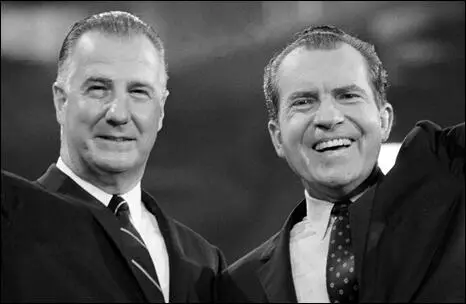On this day on 12th October
On this day in 1518 Pope Leo X's ambassador interrogates Martin Luther. This attempt to keep Luther quiet had the opposite effect. Luther now started issuing statements about other issues. For example, at that time people believed that the Pope was infallible (incapable of error). However, Luther was convinced that Leo X was wrong to sell indulgences. Therefore, Luther argued, the Pope could not possibly be infallible. During the next year Martin Luther wrote a number of tracts criticising the Papal indulgences, the doctrine of Purgatory, and the corruptions of the Church. "He had launched a national movement in Germany, supported by princes and peasants alike, against the Pope, the Church of Rome, and its economic exploitation of the German people."
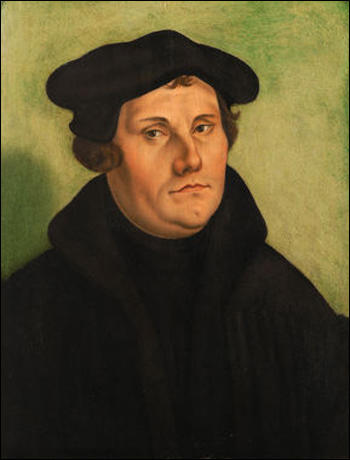
On this day in in 1845 prison reformer Elizabeth Fry died. Although Quakers do not have a funeral service, over a thousand people stood in silence as she was buried at the Society of Friend's graveyard at Barking.
Elizabeth Gurney was born in Norwich on 21st May, 1780. Elizabeth was the daughter of John Gurney, a successful businessman and a prominent member of the Society of Friends. He was a partner in the famous Gurney Bank and an owner of a woolstapling and spinning factory. Elizabeth's mother, Catherine Gurney, was a member of the Barclay banking family and was also a devout Quaker. She was very involved in charity work and spent part of each day helping the poor of the district. Catherine also insisted that her children spent two hours a day in silent worship.
Soon after having her twelfth child, Catherine Gurney became very ill. When Mrs. Gurney died, Elizabeth was only twelve years old but as one of the eldest girls, was expected to help bring up her younger brothers and sisters. This included Joseph Gurney and Hannah Gurney, the future wife of the anti-slavery campaigner, Thomas Fowell Buxton.
As a young woman Elizabeth was friendly with Amelia Alderson. Amelia's father was a member of the Corresponding Society group that advocated universal suffrage and annual parliaments. At the Alderson home Elizabeth was introduced to the ideas of Mary Wollstonecraft, Tom Paine and William Godwin. For a while she became a republican and rode through Norwich with a tricolor in her hat.
When Elizabeth was eighteen she heard the American Quaker, William Savery, preach in Norwich. Elizabeth begged her father to invite Savery to dinner. Afterwards she wrote: "Today I felt there is a God. I loved the man as if he was almost sent from heaven - we had much serious talk and what he said to me was like a refreshing shower on parched up earth."
After meeting William Savery, Elizabeth decided to devote her energies to helping those in need. Over the next few years she collected old clothes for the poor, visited the sick and and set up a Sunday School in her house where she taught local children to read. Elizabeth Fry was also appointed the committee responsible for running the Society of Friends school at Ackworth. She also visited Joseph Lancaster, a Quaker who ran a school for poor children in London.
In July 1799, Elizabeth was introduced to Joseph Fry, the son of a successful merchant from Essex. Fry was also a Quaker and the two married on 19th August 1800. Elizabeth now had to leave Norwich and went to live in Joseph Fry's family home in Plashet (now East Ham in London). Between 1800 and 1812 Elizabeth gave birth to eight children. Elizabeth remained committed to her religious beliefs and in March, 1811 became a preacher for the Society of Friends. Later that year, Elizabeth attended the inaugural meeting of the British & Foreign Bible Society.
In 1813 a friend of the Fry family, Stephen Grellet, visited Newgate Prison. Grellet was deeply shocked by what he saw but was informed that the conditions in the women's section was even worse. When Grellet asked to see this part of the prison, he was advised against entering the women's yard as they were so unruly they would probably do him some physical harm. Grellet insisted and was appalled by the suffering that he saw.
When Grellet told Elizabeth Fry about the way women were treated in Newgate, she decided that she must visit the prison. Fry discovered 300 women and their children, huddled together in two wards and two cells. Although some of the women had been found guilty of crimes, others will still waiting to be tried. The female prisoners slept on the floor without nightclothes or bedding. The women had to cook, wash and sleep in the same cell. Afterwards she wrote that the "swearing, gaming, fighting, singing and dancing were too bad to be described".
Elizabeth Fry began to visit the women of Newgate Prison on a regular basis. She supplied them with clothes and established a school and a chapel in the prison. Later she introduced a system of supervision that was administered by matrons and monitors. The women now had compulsory sewing duties and Bible reading.
Elizabeth combined prison visiting with her role as wife and mother. Three more children were born over the next few years and she also had to endure the pain of the death of her five year old daughter, Betsy. In 1817 Elizabeth Fry and eleven other Quakers, formed the Association for the Improvement of the Female Prisoners in Newgate. Her brother-in-law, Thomas Fowell Buxton was a member and the following year he published An Inquiry into Prison Discipline, a book based on his investigations of Newgate Prison.
In 1818 Thomas Fowell Buxton was elected as MP for Weymouth and was now in a position to promote Fry's work in the House of Commons. In one speech Buxton pointed out that there were 107,000 people in British prisons, a "a number greater than that of all the other kingdoms of Europe put together."
Elizabeth Fry was invited to give evidence to a House of Commons Committee on London Prisons. She told them how women slept thirty to a room in Newgate Prison, "each with a space of about six feet by two to herself". As she pointed out: "old and young, hardened offenders with those who had committed only a minor offence or their first crime; the lowest of women with respectable married women and maid-servants".
Although the MPs were impressed with Fry's work, they strongly disapproved of some of her comments such as her view that "capital punishment was evil and produced evil results". The vast majority of the members of the House of Commons fully supported the system where criminals could be executed for over 200 offences, such as stealing clothes or passing a forged banknote.
In February 1817 Charlotte Newman and Mary Ann James were sentenced to death for forgery. Fry campaigned to have women prisoners reprived but she was unable to save them from the gallows. The following month she took up the case of Harriet Skelton, one of her favourite prisoners. Skelton, a maidservant to a solicitor, had passed forged banknotes under pressure from her husband. Fry and her brother, Joseph Gurney, visited Lord Sidmouth, the Home Secretary, and pleaded for her life. Sidmouth rejected their arguments and insisted the execution went ahead. In the House of Commons Sidmouth warned that Fry and other reformers were dangerous people as they trying to "remove the dread of punishment in the criminal classes."
Lord Sidmouth rejected Fry's criticism of the British prison system. However, his successor as Home Secretary, Sir Robert Peel, was much more sympathetic, and introduced a series of reforms including the 1823 Gaols Act. As a result of the legislation introduced by Peel, there were regular visits from prison chaplains, gaolers were paid (before they were dependent on fees from the prisoners) and women warders were put in charge of women prisoners.
The problem with Peel's reforms is that they did not apply to debtors' prisons or local town gaols. Fry and Joseph Gurney now went on a tour of British prisons in order to obtain the evidence needed to persuade the government to introduce further legislation. At Aberdeen, the county gaol was housed in an ancient, square tower. In the woman's room, which measured fifteen feet by eight, they found five women and a sick child. At Newcastle-upon-Tyne, prisoners had no space to exercise. In Glasgow, Nottingham, Sheffield, Leeds, York and Liverpool, Fry found conditions as bad, if not worse, than Newgate. After their tour, Fry and Gurney, published a report of what they found in their book, Prisons in Scotland and the North of England.
By the 1820s Elizabeth Fry had become a well-known personality in Britain. It was extremely unusual for a woman to be consulted by men for her professional knowledge. Fry was strongly criticised for playing this role and she was attacked in the press for neglecting her home and family.
In 1824 Fry took a holiday in Brighton where she was shocked by the large number of beggars in the street. She investigated the situation and discovered considerable poverty in the town. Fry decided to form the Brighton District Visiting Society. The plan was to establish a team of voluntary visitors who would go into the homes of the poor where they would provide help and comfort. The scheme was a great success and soon there were District Visiting Societies in towns all over Britain.
In November, 1828, Joseph Fry was declared bankrupt. Although not involved in her husband's business dealings, the bankrupcy affected her good name. In the past subscriptions to the Association for the Improvement of the Female Prisoners in Newgate had been sent to Fry's Bank. Rumours began to circulate that some of this money had been used by Joseph Fry to help solve his financial problems. Although totally untrue, for a time these stories damaged the reputation of both Elizabeth Fry and the charities she was involved in. Elizabeth's brother, Joseph Gurney, took over Fry's business interests and made arrangements for all debtors to be paid.
Joseph Gurney also arranged for Elizabeth to receive £1600 a year and this enabled her to continue her charity work. Although prison reform was her main concern she also campaigned for the homeless in London and improvements in the way patients were treated in mental asylums. Fry also promoted the reform of workhouses and hospitals.
Fry also became concerned about the quality of nursing staff. In 1840 she started a training school for nurses in Guy's Hospital. Fry nurses wore their own uniform and were expected to tend to their patients spiritual, as well as their physical needs. Florence Nightingale wrote to Fry to explain how she had been influenced by her views on the training of nurses. Later, when Nightingale went to the Crimean War, she took a group of Fry nurses with her to look after the sick and wounded soldiers.
Queen Victoria took a close interest in her work and the two women met several times. Victoria gave her money to help with her charitable work. In her journal, Victoria wrote that she considered Fry a "very superior person". It is claimed that Victoria, who was forty years younger than Elizabeth Fry, might have modelled herself on this woman who successfully combined the roles of mother and public figure.
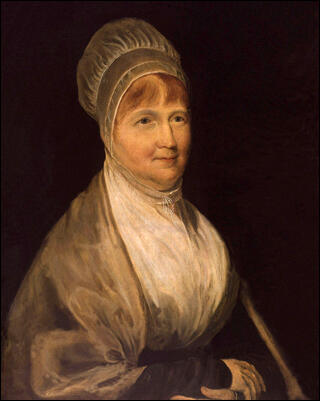
On this day in 1871 President Ulysses Grant condemns Ku Klux Klan. This was in response to Radical Republicans in Congress such as Benjamin Butler urged President Grant to take action against the Ku Klux Klan. He instigated an investigation into the organization and the following year a Grand Jury reported that: "There has existed since 1868, in many counties of the state, an organization known as the Ku Klux Klan, or Invisible Empire of the South, which embraces in its membership a large proportion of the white population of every profession and class. The Klan has a constitution and bylaws, which provides, among other things, that each member shall furnish himself with a pistol, a Ku Klux gown and a signal instrument. The operations of the Klan are executed in the night and are invariably directed against members of the Republican Party. The Klan is inflicting summary vengeance on the colored citizens of these citizens by breaking into their houses at the dead of night, dragging them from their beds, torturing them in the most inhuman manner, and in many instances murdering."

On this day in 1914 the first Battle of Ypres begins. Ypres, a medieval town in Belgium, was taken by the German Army at the beginning of the war. However, by early October, 1914, the British Expeditionary Force (BEF) was able to recapture the town. The first major German attempt to regain Ypres took place on 15th October. Experienced BEF riflemen held their positions but suffered heavy losses. German attacks took place for the next four weeks but with the arrival of the French Army the line was held. With the weather deteriorating, the Germans decided to abandon the Ypres offensive on the 22nd November. It is estimated that about 135,000 Germans were killed or badly wounded during the offensive. The BEF lost around 75,000 men and was effectively destroyed as a professional army.
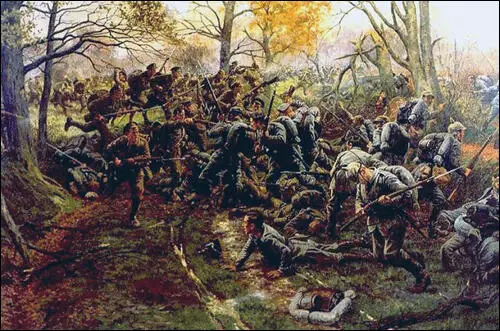
On this day in 1920 the Bolsheviks signed a peace agreement with Poland. Leon Trotsky was now able to transfer the majority of their combat troops against the southern Whites. Nestor Makhno contributed a brigade from his insurgent army, the majority mounted on horses. In all, there were 188,000 infantry, cavalry and engineers with 3,000 machine-guns, 600 artillery pieces and 23 armoured trains. General Peter Wrangels army consisted of 23,000 infantry and 12,000 cavalry. Wrangel was able to hold out for six months but defeat was inevitable. On 11th November, 1920, he ordered his troops to disengage and fall back to the assigned ports for evacuation from the Crimean ports at Eupatoria, Sevastopol, Yalta, Theodosia and Kerch. It is believed that 126 ships had been commandeered to take 145,693 members of the White Army into exile.
David Bullock, the author of The Russian Civil War (2008) has argued that no one has been able to calculate accurately the cost in human life attributable to the Civil War. "Reasoned estimates have placed the number of dead from battle and disease in the Red Army as low as 425,000 and as high as 1,213,000. Numbers for their opponents range from 325,000 to 1,287,000." Another 200,000-400,000 died in prison or were executed as a result of the "Red Terror". A further 50,000 may have been victims of the corresponding "White Terror". Another 5 million are believed to have died in the ensuing famines of 1921-1922, directly caused by the economic disruption of the war. Bullock concludes that in total between 7 and 14 million died as a result of the Russian Civil War.
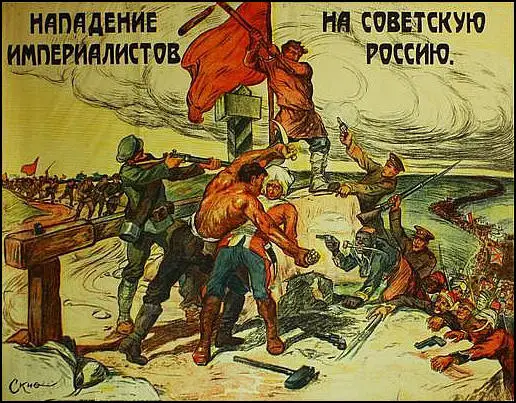
On this day in 1933 John Dillinger escapes from jail in Allen County, Ohio. This escape caused a national sensation. Dillinger's obtained more publicity when his gang broke into two Indiana police stations to obtain fresh supplies of guns and bullet-proof vests. On 23rd October the Dillinger gang robbed the Central National Bank of $75,000. The following month the gang got $27,000 from the American Bank in Racine. In early January 1934, they robbed another bank in East Chicago, Indiana, and during a gun-fight, killed a police officer. Dillinger and his gang were arrested in Tucson, Arizona, and imprisoned in Chicago. However, while waiting to be tried for murder at Crown Point Prison, on 3rd March, 1934, Dillinger escaped from prison. With a new gang, including Baby Face Nelson, Dillinger robbed banks in Minnesota and Wisconsin.
The Chicago police persuaded Anna Sage, a local prostitute, to befriend Dillinger and lead him into a trap. On 22nd July, 1934, Sage, known as the "Lady in Red", went to the Biograph Theatre. As Dillinger left the theatre, a team of police officers were waiting for him. One of them called out "John" and as he turned round the officers opened fire and Dillinger was killed in a hail of bullets.
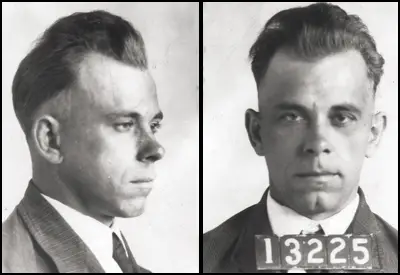
On this day in 1940 Adolf Hitler postpones Operation Sealion. Hitler told Admiral Erich Raeder that: "The invasion of Britain is an exceptionally daring undertaking, because even if the way is short this is not just a river crossing, but the crossing of a sea which is dominated by the enemy... For the Army forty divisions will be required; the most difficult part will be the continued reinforcement of military stores. We cannot count on supplies of any kind being available to us in England. The prerequisites are complete mastery of the air, the operational use of powerful artillery in the Straits of Dover and protection by minefields. The time of the year is an important factor too. The main operation will therefore have to be completed by 15 September... If it is not certain that preparations can be completed by the beginning of September, other plans must be considered."
Operation Sea Lion was finally cancelled in January 1941. Field Marshal Gerd von Rundstedt later recalled: "The military reasons for its cancellation were various. The German Navy would have had to control the North Sea as well as the Channel, and was not strong enough to do so. The German Air Force was not sufficient to protect the sea crossing on its own. While the leading part of the forces might have landed, there was the danger that they might be cut off from supplies and reinforcements."
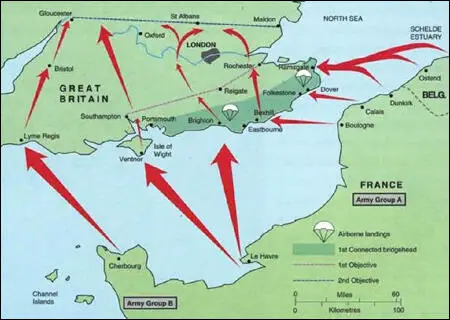
On this day in 1941 Joseph Stalin moved his government from Moscow to Volga as Nazis forces close in on Moscow. Field Marshal Gerd von Rundstedt commented "the vastness of Russia devours us". They were conquering huge territories, yet the horizon seemed just as limitless.The Red Army had lost over two million men during Operation Barbarossa, yet still more Soviet armies appeared. General Franz Halder wrote in his diary: "At the outset of the war, we reckoned on about 200 enemy divisions. Now we have already counted 360."
Field Marshal Heinrich Brauchitsch, Commander in Chief of the German Army, wanted to concentrate on the Moscow line of advance - not for the sake of capturing the capital but because they felt that this line offered the best chance of destroying the mass of Russia's forces which they "expected to find on the way to Moscow". In Hitler's view that course carried the risk of driving the Russians into a general retreat eastwards, out of reach. Brauchitsch agreed this was a danger but thought it was a risk worth taking as Moscow was not only the capital of the Soviet Union, but was a major centre for communications and the armaments industry."
Ferdor von Bock, the Commander-in-Chief of the Centre Army Group and his two panzer commanders, Heinz Guderian and Hermann Hoth, also supported Brauchitsch, in his view that they should concentrating not dispersing, the German effort against the Soviet Union. This was rejected by Adolf Hitler, who insisted on ordering part of Bock's mobile forces to assist the northern army group's drive on Leningrad and the rest to wheel south and support the advance into the Ukraine.
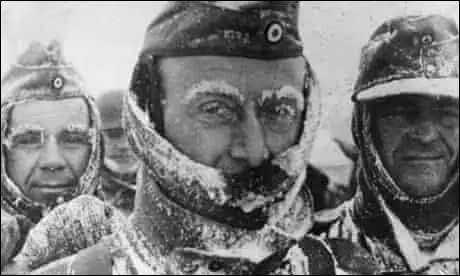
On this day in 1946 Joseph Stilwell died of stomach cancer. General George Marshall, who had been impressed with Stilwell when he was head of the tactical section of the Infantry School, arranged for him to become commander of the 7th Infantry Division in July 1940. The following year he became head of the 3rd Corps. Promoted to the rank of lieutenant general, he was sent to establish American Army Forces, China, Burma and India (CBI). By the time he had arrived in India on 25th February 1942, Singapore and Burma had both been invaded by the Japanese Army . He immediately began talks with Chaing Kai-Shek, the military leader in China. Eventually Kai-Shek gave permission for Stilwell to take command of Chinese forces in Burma.
In August 1944 Stilwell was promoted to full general and two months later was recalled to the United States and was replaced by General Albert Wedemeyer. He was appointed as head of Armed Ground Forces until given the task of replacing General Simon Buckner as commander of the 10th Army. Stilwell arrived at Okinawa on 23rd June but by that time the battle was virtually over and the following month he took over from Chester Nimitz as military governor of the Ryukyus. Considered to be temperamentally unsuitable for this job he was recalled to Washington in October 1945.
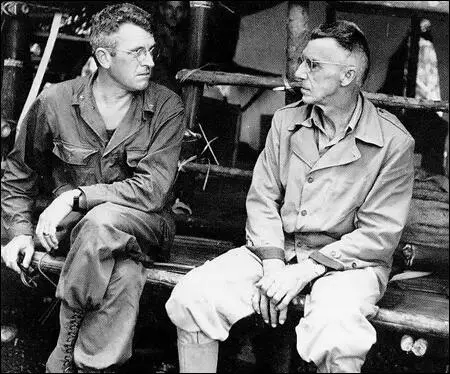
On this day in 1973 US President Richard Nixon nominated Gerald Ford to replace Spiro Agnew as Vice President. In 1968 Richard Nixon selected Agnew as his vice presidential candidate. After the defeat of Hubert Humphrey, the Democratic Party candidate, Agnew developed a reputation as a hard-liner against anti-Vietnam War protesters. Agnew was re-elected as vice-president in 1972 but the following year it was announced he was being investigated for extortion, bribery and income-tax violations while governor of Maryland. On 10th October, 1973 resigned as vice-president. Found guilty of incorrectly filling in his income-tax returns, Agnew was fined $10,000 and sentenced to three years probation.
